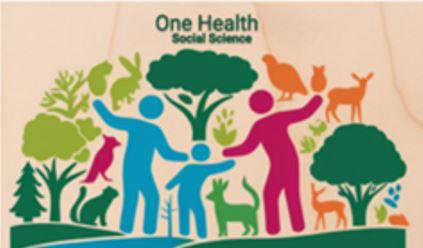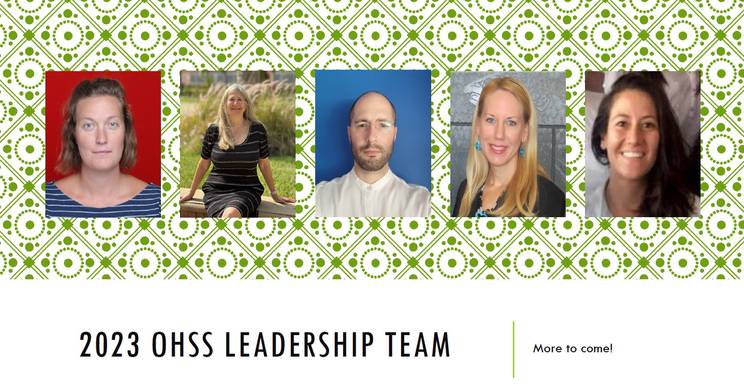
Welcome to the One Health Social Sciences (OHSS) Initiative Webpage!
" Curious? Join our community by just clicking here"
Anyone and Everyone from 'any' discipline is welcome to participate in OHSS. This is a warm and friendly, diverse, global community that encourages and supports those working across disciplines on One Health issues and helps the world understand the need for including the social sciences.
And of course you are always welcome to contact the OHSS Leadership Team
About the OHSS
The One Health Commission believes that the Social sciences are essential to understanding and addressing the root causes of disease and determinants of community health. Without an understanding of how sociological, cultural, economic, demographic, historical, linguistic, geographic, political, and other social dimensions contribute to health, society will be limited in achieving it for all. Social science disciplines are critical to making One Health the default way of doing business at all levels of research, academia, policy, and government.
Therefore, a One Health Social Sciences (OHSS) Initiative was launched in 2017 to provide a platform for innovation and integration of all social science disciplines to strengthen the One Health movement. This team invites social science researchers and practitioners to share their expertise in utilization of the One Health approach to facilitate achievement of the United Nations Strategic Development Goals of ecosystem sustainability, global food security, and equitable health.
The awareness raising and information sharing, research-based OHSS Food Safety / Food Security (OHSS-FSFS) sub-working group was founded in 2021 to frame food safety issues in One Health from a social sciences perspective.
In 2023 the OHSS restructured and formed additional functional working groups to focus on funding, networking, mentoring, webinars, and publications. Working with sub-group co-chairs and the OHSS advisory team, the OHSS leadership revised the Mission statement to include the importance of the humanities and the arts within an inclusive and robust interdisciplinary One Health approach. The new statement, including rationale, mission, vision and goals appears here.
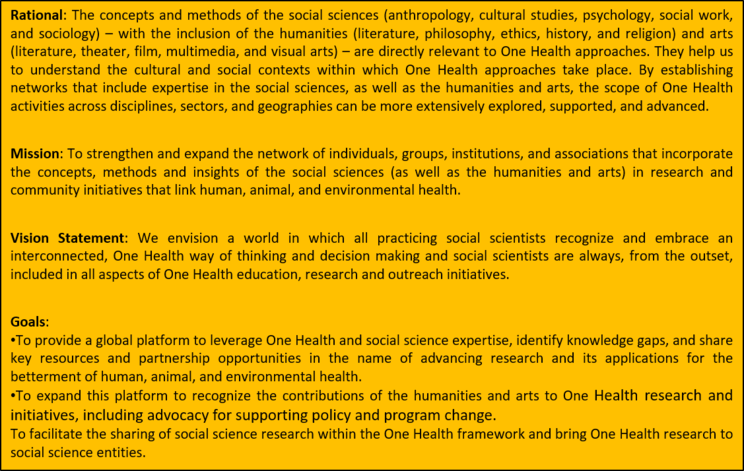
In January of 2024, the work of the functional sub-committees culminated with presentation of stated objectives for each sub-group and an event calendar, including bimonthly general membership meetings and quarterly presentations. The OHSS webpage is updated (see below) with information about each of the subcommittees and their co-chairs. Please reach out to the co-chairs if you are interested in contributing your time to a specific committee.
The OHSS-Human Animal Bond (OHSS-HAB) working group formed in late 2024 and is still emerging.
See this recent 'Spot-On' Popular Media Op Ed
March 7, 2024 Authors: Kaylee Byers, Lara Hollmann, Salome A Bucakchi, Sara Robinson, In: The CONVERSATION
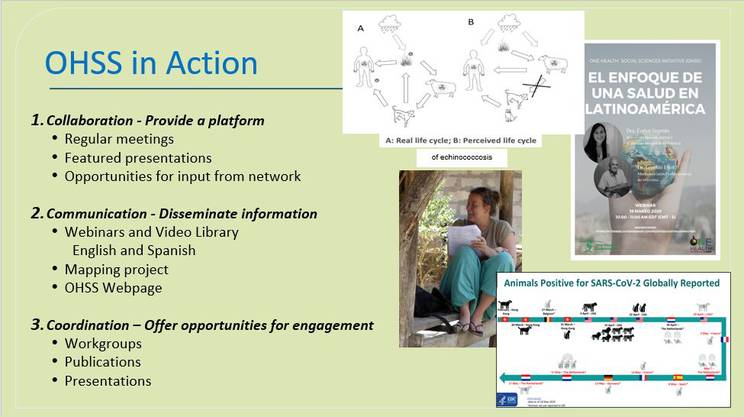
***
***
***
RESOURCES / ACTIVITIES
A. Our Membership meetings
These meetings offer participants the opportunity to network with others working in One Health and the social sciences and to learn something new. (Recordings of OHSS meetings are provided to OHSS participants after each meeting to assist our follow up actions and for those who could not join in at the assigned meeting time. Contact ohss@onehealthcommission.org for assistance)
March 25, 2025 OHSS Meeting
June 27, 2024 OHSS Meeting
April 12, 2024 OHSS Meeting For this meeting Dr. Cheryl Stroud, Executive Director of the One Health Commission provided an overview of the OHSS from how it got started to where it is today, and what might be envisioned for tomorrow. The Leadership Team shared updates on what OHSS had been working on during its restructuring and an opportunity for conversation was provided. It’s when we come together, share, learn, and get to know one another that connections can be made.Recording Available Enter your information and Click Register to start the recording. https://tinyurl.com/bdh2dnbn
B. One Health Social Sciences Webinar Series
In addition to its team meetings, the OHSS Initiative also hosts a free webinar series featuring inspirational speakers addressing the role of the social sciences in advancing animal, human, and environmental health systems. See the OHSS Webinars Library
Webinar: June 10, 2024
The Human-Animal Bond and One Health: Zooeyia is a lesser known One Health term coined in 2011 by Canadian researchers Hodgson and Darling. Zooeyia is the positive benefits for human health from interacting with animals. Join Dr. Colleen Dell (www.colleendell.com) from the One Health & Wellness office at the University of Saskatchewan in Canada to learn about the zooeyia-focused research & practice of the PAWSitve Connections Lab that she co-directs (www.PAWSitiveconnections.com). This will include an introduction to the concept of zooeyia and its relationship to the human-animal bond, understanding environment from a social, built and ecological standpoint, and the role of animal welfare. Dr. Dell’s expertise stems from extensive experience working alongside therapy dogs, service animals and her own beloved pets. Please join in with your pet if you wish, as this presentation is very much about the interconnection between human, animal and environment health. @PAWSitiveCanineConnections Recording available.
C. OHSS Sub-Working Groups (2021 - to present)
The Food Safety and Food Security Small Working Group was founded in 2021 as a sub-group of the One Health Commission’s One Health Social Sciences Initiative.
|

|
See recent activities / recordings on the OHSS-FSFS YouTube channel here.
Join the OHSS-FSFS Whats App Group
Learn more and Meet the OHSS-FSFS Team
_____________________________________________________________
__________________________________________________________
Action-based subcommittees
1. Grants and Funding
Co-leaders: Sara Agnelli (PhD | Classics; Assistant Director for Graduate Engagement, Center for the Humanities and Public Sphere -University of Florida); Nai Rui Chng and Jeyver Rodriguez (Professor Center for Ethics and Social Responsibility, Faculty of Religious Science and Philosophy - Universidad Catolica de Temuco)
2. New Horizons
Co-leaders: Colleen Dell (sociologist; Research Chair in One Health and Wellness - University of Saskatchewan) and Scott Moreland (PhD (Duke) economist with over 45 years of experience, retired from Palladium)
3. Membership and Mentoring
Co-leaders: Kathryn Dalton (PhD VMD MPH; IRTA Postdoctoral Fellow; National Institute of Environmental Health Sciences - National Institutes of Health) and Nicholas Ngwili (PhD | Livestock Production Systems; post-doctoral scientist - International Livestock Research Institute)
4. Webinars and Presentations
Leader: Debbie Stoewen (DVM, MSW, RSW, PhD - University of Guelph)
5. Special Publication
Leader: Delia Randolph (Professor Food Safety Systems, Natural Resources Institute - University of Greenwich; Joint appointed scientist, Animal and Human Health Program - International Livestock Research Institute)
D. Past OHSS Initiative Small Working Groups (2018 - 2020)
1. OHSS Publication Venues Working Group 
Co-Chairs
Helena Chapman, MD, PhD, MPH - hjchapman@gmail.com
Victor del Rio Vilas, DVM, MSc, PhD - vdelriovilas@yahoo.co.uk
Goal
The publications working group (PWG) focuses on advocacy. It aims to communicate the relevance of integrating social sciences and One Health, and to disseminate good practices, benchmarks, and success stories on this copula.
Rationale
Although social sciences concepts and methods are directly relevant to One Health approaches, there are relatively few publications in the evidence base on this topic. To address this gap, transdisciplinary collaborations that integrate social sciences and One Health approaches will be key to advancing scientific discovery.
Objectives
- To compile a comprehensive list of potential peer- and non-peer reviewed publication venues that would support multidisciplinary collaborative papers
- To disseminate scientific papers to peer- and non-peer reviewed national and international journals
- Letters to Editor, Perspectives/Commentaries, Reviews, Original Research
- To strengthen the network of social scientists who are interested to learn more about One Health and represent diverse specialties and geographies
- To investigate local, national, and international agencies, organizations, and universities that can provide venues to present oral or poster presentations on One Health topics
- University seminars or symposiums, Local community events, National or international conferences
Outcome
See also additional Journals and Periodicals known to publish One Health related items.
2. OHSS Mapping Actors Working Group (MWG)
Co-Chairs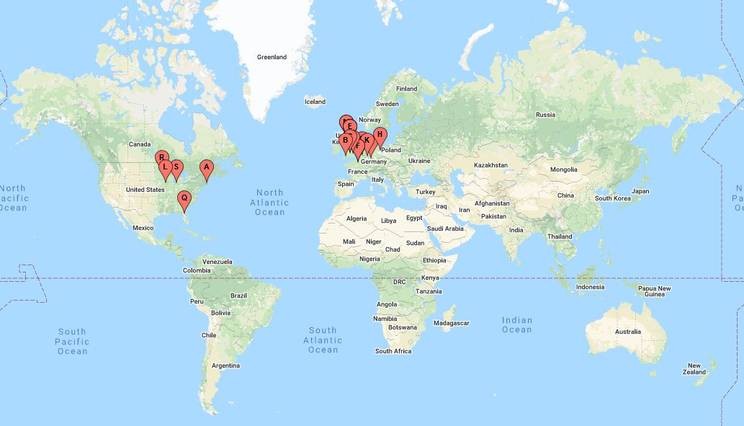
Bernardo Moreno Peniche, MD, MSc - bermorenop@gmail.com
Helena Chapman, MD, PhD, MPH - hjchapman@gmail.com
Goal
The Mapping Actors Working Group (MWG) aims to identify the network of scientists and community practitioners who incorporate One Health and social science concepts and methods in their research and practice.
Rationale
Although trans-disciplinary collaborations are promoted in the scientific disciplines, scientists and community practitioners continue to work in silos. To address this gap, identifying scientists and community practitioners who incorporate One Health and social science concepts and methods will strengthen the development of One Health research proposals, community initiatives, and co-authored publications.
Objectives
- To compile a small list of scientists and practitioners in One Health education, community practice, and research.
- To strengthen the network of scientists and practitioners who are interested to incorporate One Heath and social science concepts and methods into their research and practice.
E. One Health Social Sciences Publications (chronological by publication date)
Please make us aware of any articles / publications that we have missed that belong here. ohss@onehealthcommission.org
2024
One Health Ethics and the Ethics of Zoonoses: A Silent Call for Global Action, Rodriguez J,Veterinary Sciences. 2024; 11(9):394. https://doi.org/10.3390/vetsci11090394
American Medical Association Journal of Ethics- February 2024 Special Issue – Health Ecology and Disease Transmission, Guest Editor, Ariadne A. Nichol
Editorial: Emerging Infectious Diseases at the Intersections of Human, Animal, and Environmental Health, Nichol AA, AMA J Ethics. 2024;26(2):E99-102. doi: 10.1001/amajethics.2024.99.
Sample articles:
Meagher KM, Can One Health Policy Help Us Expand an Ethics of Interconnection and Interdependence? AMA J Ethics. 2024;26(2):E162-170. doi: 10.1001/amajethics.2024.162.
Gray GC, Pulscher PA, Alsharif HO Five Things Clinicians Need to Know About Zoonotic Viral Spillover and Spillback, AMA J Ethics. 2024;26(2):E122-131. doi: 10.1001/amajethics.2024.122.
Diversity, equity and inclusion in One Health could crucially support prevention of health threats, but a change in mindset is needed, Robbiati C, Miarisoa Andriamandroso A, Auerswald H, Cediel Becerra N, Dente MG, . … Alders, R, Cambridge Open Engage. May 2024, doi:10.33774/coe-2024-4zf5g-v2 T (Preprint -not yet peer-reviewed)
Gender considerations in One Health: a framework for researchers, Galiè A, McLeod A, Campbell ZA, Ngwili N, Terfa ZG, Front. Public Health, 27 February 2024, Section: Life-Course Epidemiology and Social Inequalities in Health, Vol. 12, https://doi.org/10.3389/fpubh.2024.1345273
One Health and sex and gender-related perspective in the ecosystem: Interactions among drivers involved in the risk of leptospirosis in Europe. A scoping review, Cataldo C, Bellenghi M, Masella R, Busani L, One Health. 2024 Jun 21;19:100841. doi: 10.1016/j.onehlt.2024.100841.
Toward social and ecological equity: A feminist lens on One Health, Léchenne M, Cediel-Becerra N, Cailleau A, Greter H, et.al., CABI One Health, (2024), doi:10.1079/cabionehealth.2024.0002
2023
A global analysis of One Health Networks and the proliferation of One Health collaborations, Mwatondo, A et al. The Lancet. 2023; 401. https://doi.org/10.1016/S0140-6736(22)01596-3
A One Health Social Science Approach to Water Security and Gender Equity in Rural Uganda, Nankanja A, et al., One Health Cases. CABI. 2023. https://doi.org/10.1079/onehealthcases.2023.0026
Barriers and enablers to the implementation of one health strategies in developing countries: a systematic review, Yopa DS, Massom DM, Kiki GM, Sophie RW, Fasine S, Thiam O, Zinaba L, Ngangue P, Front Public Health, 2023 Nov 23;11:1252428. doi: 10.3389/fpubh.2023.1252428
COVID-19 exposes weaknesses in public health in the Peruvian Amazon and highlights opportunities for a One Health approach, Ormea V, Evaristo R, Durand S, Lover A, Rüegg SR, CABI One Health. 2023. https://doi.org/10.1079/cabionehealth.2023.0006
One Health challenges and actions: Integration of gender considerations to reduce risks at the human-animal-environmental interface, Cataldo C, Bellenghi M, Masella R, Busani L, One Health Vol.16, June 2023; doi: 10.1016/j.onehlt.2023.100530
What does One Health want? Feminist, posthuman, and anti-colonial possibilities, Van Patter LE, Linares-Roake J, Breen AV, One Health Outlook 5, 4 (2023). https://doi.org/10.1186/s42522-022-00076-9
Whose health and which health? Two theoretical flaws in the One Health paradigm, Selter F, Salloch S, BioEthics, June 9, 2023, https://doi.org/10.1111/bioe.13192
2022
Identifying intersectional feminist principles in the One Health framework, Hardy E, Standley CJ. One Health. 2022; 15. https://doi.org/10.1016/j.onehlt.2022.100404
One Health for All: Advancing Human and Ecosystem Health in Cities by Integrating an Environmental Justice Lens, Murray H, Buckley J, Byers KA, Fake K, Lehrer EW, Magle SB, Stone C, Tuten H, Schell CJ, Annual Review of Ecology, Evolution, and Systematics, 2022; 53:1, 403-426.https://doi.org/10.1146/annurev-ecolsys-102220-031745
One health ethics: “What then must we do?”, Lindenmayer, JM et al., CABI One Health. CABI International. 2022. https://doi.org/10.1079/cabionehealth.2022.0011
Systems in Flames: Dynamic Coproduction of Social–Ecological Processes, Cadenasso ML, et al. BioScience. 2022; 72:8, 731–744. https://doi.org/10.1093/biosci/biac047
Social insights on the implementation of One Health in zoonosis prevention and control: a scoping review. He J, Guo Z, Yang P et al. Infect Dis Poverty. 2022; 11:48. https://doi.org/10.1186/s40249-022-00976-y
Vulnerability and One Health assessment approaches for infectious threats from a social science perspective: a systematic scoping review, Jeleff M, Lehner L, Giles-Vernick T, Dückers MLA, Napier AD, Jirovsky-Platter E, Kutalek R, The Lancet Planetary Health, 2022; 6:8, e682-e693. https://doi.org/10.1016/S2542-5196(22)00097-3
Woman-Sensitive One Health Perspective in Four Tribes of Indigenous People From Latin America: Arhuaco, Wayuú, Nahua, and Kamëntsá, Cediel-Becerra NM, Prieto-Quintero S, Mendez Garzon AD, Villafañe-Izquierdo M, Rúa-Bustamante CV, Jimenez N, Hernández-Niño J, Garnier J, Frontiers in Public Health, 2022; Vol 10. https://doi.org/10.3389/fpubh.2022.774713
2021
Lederman Z, Magalhães-Sant’Ana M, Voo TC, Stamping Out Animal Culling: From Anthropocentrism to One Health Ethics. J Agric Environ Ethics 34, 27 (2021). https://doi.org/10.1007/s10806-021-09868-x
Socializing One Health: an innovative strategy to investigate social and behavioral risks of emerging viral threats. Saylors K, Wolking DJ, Hagan E, et al. One Health Outlook. 2021; 3:11. https://doi.org/10.1186/s42522-021-00036-9
2020
Accounting for One Health: Insights from the social sciences. Rendre compte de One Health : réflexions issues des sciences sociales. Michalon J. Parasite. 2020; 27:56. doi:10.1051/parasite/2020056
Advancing with Transdisciplinarity: Effective Responses for Coronavirus, Lawrence R. Transdisciplinary Journal of Engineering & Science. 2020; 11. https://doi.org/10.22545/2020/00141
Integrating the social sciences in epidemic preparedness and response: A strategic framework to strengthen capacities and improve Global Health security, Bardosh KL et al. Global Health 2020; 16:120. https://doi.org/10.1186/s12992-020-00652-6
Involving social sciences in teamwork to tackle a troubling, complex health issue (Taenia solium cystocercosis) in rural Kenya. (Listen to recording at bottom of page)
One health ethics: A response to pragmatism, Lederman, Z., & Capps, B. (2020). Journal of Medical Ethics, 46(9), 632–633. DOI: 10.1136/medethics-2019-105859
One Health Ethics, Capps B, BioEthics, December 12, 2021, https://doi.org/10.1111/bioe.12984
2018 & 2019
Gender Analysis for One Health: Theoretical Perspectives and Recommendations for Practice, Friedson-Ridenour S, Dutcher TV, Calderon C, et al. EcoHealth. 2019; 16, 306–316. https://doi.org/10.1007/s10393-019-01410-w
Operationalizing One Health Employing Social-Ecological Systems Theory: Lessons From the Greater Mekong Sub-region, Wilcox BA, Aguirre AA, De Paula N, et al. Front Public Health, 2019; 7:85. Epub 2019 May 22
Anthropological and socioeconomic factors contributing to global antimicrobial resistance: a univariate and multivariable analysis, Collignon P, Beggs JJ, Walsh TR, et al. Lancet Planetary Health. 2018; 2(9):e398-e405. doi: 10.1016/S2542-5196(18)30186-4
Rethinking “One Health” through Brucellosis: ethics, boundaries and politics, Hermesh B, Rosenthal A, Davidovitch N. 2019. Monash Bioethics Review 37: 21–36. DOI: 10.1007/s40592-018-0079-9
Does One Health require a novel ethical framework? Johnson J, Degeling C. 2019. Journal of Medical Ethics 45 (4): 239–243. https://doi.org/10.1136/medethics-2018-105043
One Health as a moral dilemma: Towards a socially responsible zoonotic disease control. Zoonoses, van Herten J, Bovenkerk B, Verweij M., Public Health. 2019 Feb;66(1):26-34. doi: 10.1111/zph.12536.
2016
Ethical promises and pitfalls of One Health. Verweij M, Bovenkerk B. 2016. Public Health Ethics 9 (1): 1–4. https://doi.org/10.1093/phe/phw003
Zika in Singapore: insights from One Health and social medicine, Lysaght T, Lee TL, Watson S, Lederman Z, Bailey M, Tambyah PA. Singapore Med J. 2016 Oct;57(10):528-529. doi: 10.11622/smedj.2016161. Epub 2016 Sep 19.
2015 and Earlier
See a Special Issue of Social Science & Medicine, One World One Health?? Social Science engagements with the one medicine agenda, Vol 129, pp. 1-130. (March 2015.), Edited by Dr. Susan Chaddock and Professor Steve Hinchliffe. Here are some of the articles from that issue.
-
A One Health, participatory epidemiology assessment of anthrax (Bacillus anthracis) management in Western Uganda, Coffin JL, Monje F, Asilmwe-Karimu G, Amuguni HJ, Odoch T, Social Science & Medicine, Vol 129, pp. 44-50.
- Recommendations for the role of social science research in One Health. Lapinski M, Funk J, Moccia L. Social Science & Medicine, Vol 129, 2015; 129:51-60.
-
The world in a box? Food security, edible insects, and “One World, One Health” collaboration, Yates-Doerr E, Social Science & Medicine, Vol 129, pp. 106-112.
-
The global condition of epidemics: Panoramas in A (H1N1) influenza and their consequences for One World One Health programme, Tirado F, Gómez A, Rocammora V, Social Science & Medicine, Vol 129, pp. 113 – 122.
-
One-health approach as counter-measure against “autoimmune” responses in biosecurity, Mutsaers I, Social Science & Medicine, Vol 129, pp. 123-230.
Implementing a One Health approach to emerging infectious disease: reflections on the socio-political, ethical and legal dimensions, Degeling C, Johnson J, Kerridge I, et al. BMC Public Health. 2015; 29(15):1307. doi: 10.1186/s12889-015-2617-1.
A Conceptual Framework for Analyzing Social-Ecological Models of Emerging Infectious Diseases. Finucane ML, Fox J, Saksena S, Spencer JH., (2014). Chapter 5 In: Manfredo M, Vaske J, Rechkemmer A, Duke E., (eds) Understanding Society and Natural Resources. Springer, Dordrecht. https://doi.org/10.1007/978-94-017-8959-2_5
One Health from a Social–Ecological Systems Perspective: Enriching Social and Cultural Dimensions, Ross H. (2012), In: Mackenzie J, Jeggo M, Daszak P, Richt J (eds) One Health: The Human-Animal-Environment Interfaces in Emerging Infectious Diseases. Current Topics in Microbiology and Immunology, vol 366. Springer, Berlin, Heidelberg. https://doi.org/10.1007/82_2012_275
Animal-human connections, “one health,” and the syndemic approach to prevention, Rock M, Buntain BJ, Hatfield JM, Hallgrímsson B, 2009. Social Science and Medicine 68 (6): 991–995. DOI: 10.1016/j.socscimed.2008.12.047
Recommendations for the role of social science research in One Health, Lapinski M, Funk J, Moccia L Social Science & Medicine 129, 51-60, (2015). https://doi.org/10.1016/j.socscimed.2014.09.048
OHSS LEADERSHIP TEAM (From left to right)
Co-chairs: Séverine Thys (MSc, PhD - Health anthropologist at CIRAD, Montpellier) and Wendy J. Rib (DVM, PhD - Veterinarian and anthropologist at St. Petersburg College, Florida)
Advisory team: Bernardo Moreno (MD, MSc - Medical doctor and social scientist at University California Berkeley, San Francisco), Helena Chapman (MD, PhD, MPH - Medical doctor and epidemiologist at the Applied Sciences Program of the NASA Earth Science Division, Washington), and Verónica Ormea (DVM, MSc - Veterinarian at at the Universidad Peruana de Ciencias Aplicadas, Lima)









